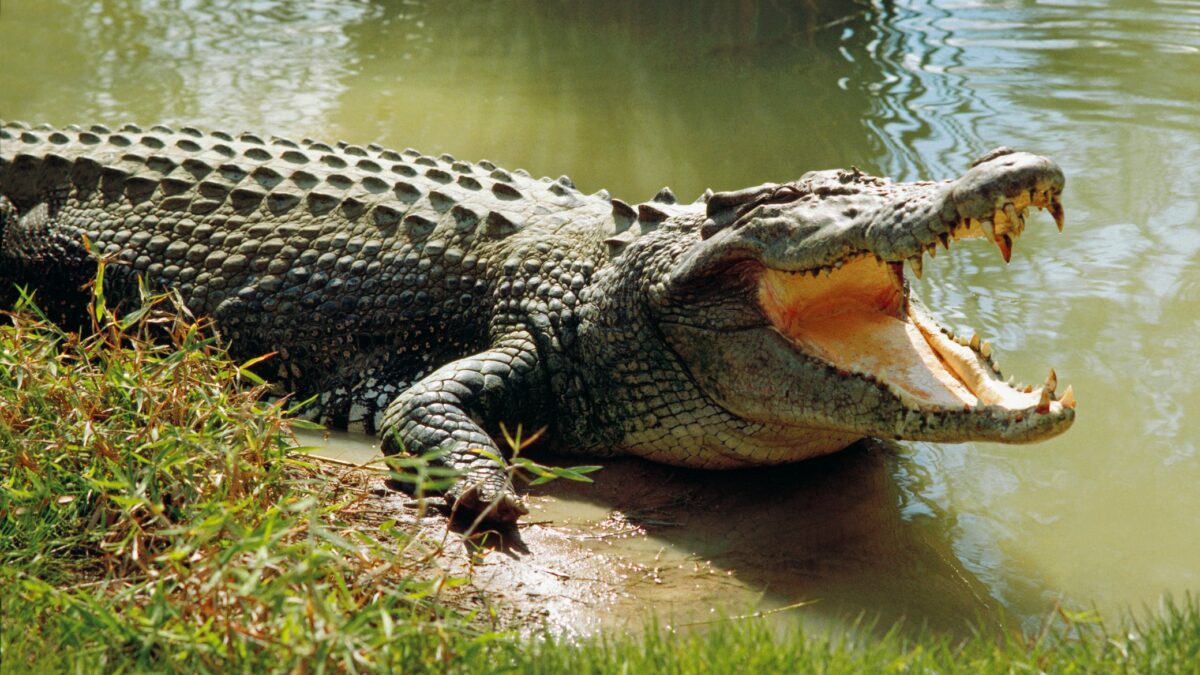
Crocodiles are fascinating creatures that have captured the imagination of humans for centuries. These ancient reptiles have been around for millions of years, evolving and adapting to survive in various habitats around the world. Known for their powerful jaws, armored bodies, and stealthy hunting skills, crocodiles are apex predators in their ecosystems. In this article, we will explore 15 fascinating facts about crocodiles that will leave you awestruck by their incredible capabilities and unique behaviors. From their size and strength to their impressive lifespan and survival tactics, crocodiles have plenty of intriguing features to discover. So, let’s dive into the world of crocodiles and uncover the secrets of these magnificent reptiles.
Key Takeaways:
- Crocodiles are ancient, powerful, and adaptable creatures with impressive longevity. They play a crucial role in maintaining healthy ecosystems and are in need of conservation efforts to ensure their survival for future generations.
- With their strong jaws, impressive size, and diverse diet, crocodiles are skilled predators both in water and on land. They are also culturally significant and hold a special place in myths and legends around the world.
The Powerful Jaws of Crocodiles
Crocodiles have one of the strongest bite forces among all living animals. Their jaws can exert a tremendous amount of pressure, making it easy for them to capture and devour their prey.
The Ancient Reptiles
Crocodiles are one of the oldest reptilian species on Earth, dating back over 200 million years. They have managed to survive and adapt to various environmental changes.
Ambitious Swimmers
Crocodiles are excellent swimmers and can stealthily move through the water. They use their powerful tails to propel themselves forward, making them skilled predators in aquatic environments.
Crocodiles are Equally Adapted to Land
Although they are known for their swimming abilities, crocodiles are equally comfortable on land. They can walk on all fours and even run in short bursts, making them versatile hunters.
A Variety of Species
There are several species of crocodiles, including the saltwater crocodile, Nile crocodile, American crocodile, and more. Each species has adapted to different habitats and has unique characteristics.
Impressive Size and Weight
Crocodiles are massive reptiles, with some species reaching lengths of up to 20 feet and weighing over 2,000 pounds. They are known to be the largest living reptiles on the planet.
Survivors with Regenerative Abilities
Crocodiles are incredible survivors. They can regrow teeth throughout their lives, allowing them to continuously replace damaged or lost teeth, ensuring their hunting prowess is never compromised.
Crocodilian Communication
Crocodiles use a variety of vocalizations and body movements to communicate with each other. From low-frequency bellows to jaw slapping, these behaviors convey dominance, territorial boundaries, and courtship rituals.
Meticulous Mothers
Crocodile mothers are known for their dedicated and meticulous parenting. They build nests, lay eggs, and carefully guard their young until they hatch. Once hatched, the mother aids her offspring in their journey to water.
A Diverse Diet
Crocodiles are opportunistic predators and have a diverse diet. They feed on fish, birds, mammals, and even larger animals such as wildebeests. Their powerful jaws and sharp teeth allow them to tear apart their prey.
Impressive Life Span
Crocodiles have remarkable longevity, with some species living up to 70 years or more. Their ability to adapt, survive, and thrive in various habitats contributes to their long life spans.
Masters of Camouflage
Crocodiles are masters of camouflage. With their scaly skin and ability to remain still for extended periods, they can easily blend into their surroundings, making it easier to ambush their prey.
Cultural and Historical Significance
Crocodiles hold great cultural and historical significance in various regions around the world. They play roles in myths, legends, and religious beliefs, and their depictions can be found in ancient artwork and artifacts.
Environmental Indicators
Crocodiles play a significant role in maintaining the balance of ecosystems. As top predators, their presence indicates a healthy ecosystem, as they help regulate populations of other species.
Conservation Efforts
Due to habitat loss and hunting, many crocodile species are threatened or endangered. Conservation efforts aim to protect these remarkable creatures and their ecosystems to ensure their survival for future generations.
Conclusion
In conclusion, crocodiles are fascinating creatures with a rich history and remarkable abilities. From their ancient lineage to their impressive hunting techniques, these reptiles have captured the curiosity and awe of humans for centuries. With their powerful jaws, strong bodies, and exceptional camouflage, crocodiles have successfully adapted to various aquatic environments around the world.Despite their fearsome reputation, crocodiles play a crucial role in maintaining ecosystem balance. As apex predators, they regulate the population of prey species, ensuring the health and stability of their habitats. However, due to factors such as habitat loss and poaching, many species of crocodiles are currently endangered and in need of conservation efforts.Learning about crocodiles not only provides us with a deeper understanding of these incredible creatures but also emphasizes the importance of preserving their habitats and protecting their populations. By appreciating and respecting these ancient reptiles, we can contribute to their continued existence for future generations to marvel at.
FAQs
Q: How long do crocodiles live?
A: Crocodiles have an average lifespan of 70 to 100 years, with some individuals even living up to 120 years.
Q: Are crocodiles aggressive towards humans?
A: While crocodiles are inherently wild and can be dangerous, they generally avoid human contact if left undisturbed. Most attacks occur when humans venture too close to their territory or during attempts to feed them.
Q: How fast can a crocodile swim?
A: Crocodiles are powerful swimmers and can reach speeds of up to 20 miles per hour (32 kilometers per hour) in short bursts.
Q: Are crocodiles and alligators the same?
A: No, they belong to different biological families. Crocodiles have a V-shaped snout, while alligators have a U-shaped snout. Additionally, crocodiles are typically found in saltwater habitats, while alligators are more commonly found in freshwater environments.
Q: How do crocodiles hunt?
A: Crocodiles are ambush predators, patiently waiting for their prey to come close before striking. They use their powerful jaws to seize and drag their prey underwater, drowning them with their tremendous strength.
Q: How many species of crocodiles are there?
A: There are 13 recognized species of crocodiles spread across various regions, including Africa, Asia, Australia, and the Americas.
Q: Can crocodiles climb trees?
A: Yes, some species of crocodiles, such as the American crocodile, are capable of climbing trees, particularly when they are young and lighter in weight.
Q: Do crocodiles have any natural predators?
A: Adult crocodiles have few natural predators due to their size and strength. However, some larger species, such as Nile crocodiles, may occasionally fall prey to lions, hyenas, and other large carnivores.
Q: Are crocodiles intelligent?
A: While not on the same level as mammals, crocodiles display signs of intelligence. They can learn and remember complex behaviors and have been observed using tools such as sticks to lure prey.
Q: Can crocodiles survive out of water?
A: Yes, crocodiles can survive for extended periods out of water as long as they stay in a suitable habitat with access to shade and are not exposed to extreme temperatures.
Was this page helpful?
Our commitment to delivering trustworthy and engaging content is at the heart of what we do. Each fact on our site is contributed by real users like you, bringing a wealth of diverse insights and information. To ensure the highest standards of accuracy and reliability, our dedicated editors meticulously review each submission. This process guarantees that the facts we share are not only fascinating but also credible. Trust in our commitment to quality and authenticity as you explore and learn with us.


